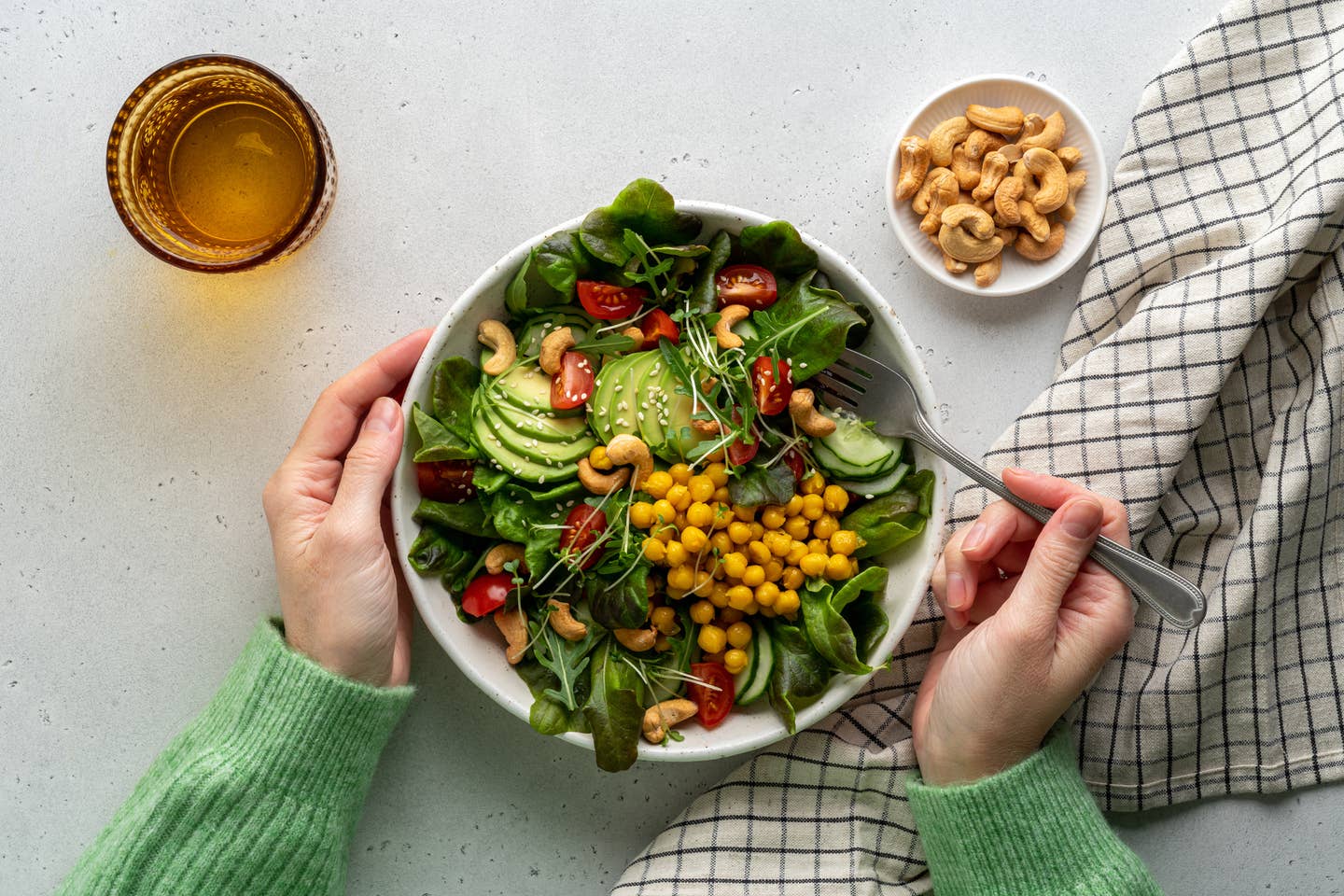
A Healthy Plant-Based Diet Reduces Breast Cancer Risk by 14%, Study Finds
Research presented at the American Society for Nutrition is giving us yet another reason to pile our plates high with vegetables and fruits and skip the packaged food as well as animal products. A plant-based or plant-centric diet with high levels of fruit and vegetables can significantly lower the risk of breast cancer in postmenopausal women, the new study found. A vegetable- and fruit-rich, plant-forward diet that is low in processed foods and high in fiber can help cut a woman's breast cancer risk by 14 percent.
Unlike similar studies that examined the relationship between cancer and diet, the researchers from the Center for Research in Epidemiology and Population Health at Paris-Saclay University in France honed in on the difference between eating a healthy plant-based diet and an unhealthy one.
The research team looked at two decades of data from over 65,000 postmenopausal women who were living in France and compared eating habits among healthy plant-based women, unhealthy mostly plant-based women and those who are animal products. The women filled out dietary questionnaires at the start of the study back in 1993 again in 2005.
Among the participant population, a total of 3,698 women were diagnosed with breast cancer during the study period. The researchers analyzed the dietary habits and looked at how18 food groups impacted the women's health. One such group was comprised of women who focused on healthy plant-based eating, versus those who ate more refined or processed foods and animal products.
The findings were stark: Those women who ate a mostly healthy plant-based diet of whole grains, fruit, vegetables, nuts, legumes, and who also drank coffee were less likely to get breast cancer than those women who followed unhealthy eating patterns, which included high-fructose fruit juice, refined grains (such as regular pasta or white bread made with white, processed flour), sugary desserts, and sugar-filled beverages such as sodas.
“These findings highlight that increasing the consumption of healthy plant foods and decreasing the consumption of less healthy plant foods and animal foods might help prevent all types of breast cancer,” the study’s lead author Sanam Shah said in a statement.
The research team examined the data of all types of breast cancers, and the results held up. The data revealed that not only were participants 14 percent less like to develop breast cancer with a healthy plant-rich diet, but that an unhealthy diet actually increase breast cancer risk. Women with the least healthy diet faced a 20 percent higher risk of breast cancer compared with the general population.
Eating Plant-Based to Lower Risk of Breast Cancer
The French study joins a growing body of research linking plant-based diets to lower risks of developing cancer – specifically hormonal-related cancers. This study is distinguished by its focus on healthy versus unhealthy plant-based options. The findings suggest that a plant-heavy diet will help prevent breast cancer, but Shah stated that there is plenty more research to determine the links and causality between cancer and diet.
“What is different about our study is that we could disentangle the effects of the quality of plant foods, which has not been the focus of previous studies on other dietary patterns,” Shah said. “By scoring healthy, unhealthy, and animal-based foods, we comprehensively analyzed food intake by considering the ‘healthiness’ of food group.”
Milk Consumption Associated with Breast and Prostate Cancer
Certain animal-based foods present a more potential danger to women's health, including dairy products. One recent study published in BMC Medicine found that dairy is associated with a higher risk of breast cancer. During the study, the participants consuming just a quarter cup of milk per day had a 17 percent higher risk of developing breast cancer than those who skipped dairy altogether.
Prostate cancer is also associated with dairy consumption, according to a recent study. Among men who consumed a small amount of dairy on a daily basis, the risk of prostate cancer increases by a hefty 60 percent, the research found. There was no difference between full fat and non-fat dairy on prostate cancer risk, the study also concluded, which led the researchers to say that fat was not the factor, dairy was. The study emphasized that men who have markers for elevated prostate cancer risk should avoid drinking dairy milk.
Plant-Based Protein Helps Improve the Health of Older Women
A diet rich in plant-based foods provides more health benefits than just lowering the risk of breast cancer. This June, researchers asserted that a diet high in plant-protein reduces the risk of frailty in women over 60 by up to 42 percent. Even the most active people experience frailty once they hit old age, but this study suggests that plant-based protein could help people retain muscle and bone strength well into their 80s.
Bottom Line: Add Healthy Plant-Based Foods to Your Diet to Lower Cancer Risk
French researchers concluded that adding more vegetables and fruits to your diet can significantly reduce your risk of developing breast cancer. The new research adds to a growing body of research pointing to the health benefits of plant-based dieting, especially in older age. Another recent study found that a plant-based diet can prolong life expectancy by over 10 years, by helping to reduce the risks of cancers, frailty and other chronic illnesses.
For how to start a plant-based diet, check out The Beet's Beginner's Guide to a Plant-Based Diet.
More From The Beet






